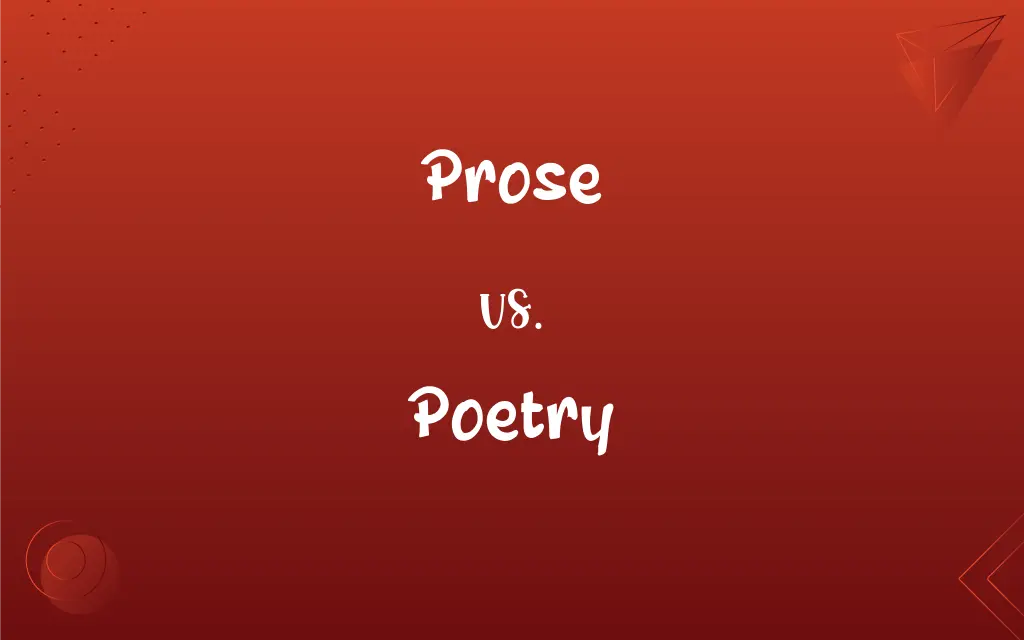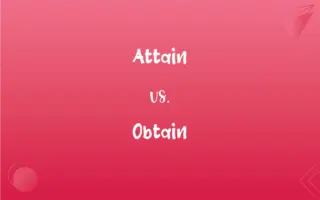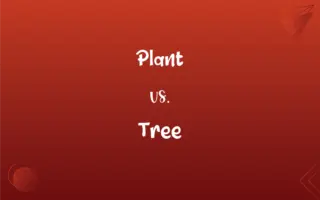Prose vs. Poetry: What's the Difference?
Edited by Aimie Carlson || By Harlon Moss || Updated on October 16, 2023
Prose is straightforward spoken or written language without metrical structure, while poetry is a literary form using elevated style, rhythm, and often rhyme.

Key Differences
Prose and poetry are two primary forms of written expression, each with distinct characteristics. Prose is a form of language that exhibits a grammatical structure and natural flow, reflecting the way people typically speak. It can be found in novels, essays, and articles, capturing thoughts in a direct manner.
Poetry, in contrast, is a rhythmic and metaphorical form of literature. It often employs devices such as rhyme, meter, and alliteration. Poetry seeks to evoke emotions and paint vivid images through compact language, tapping into the depths of human experience in a way prose might not.
In prose, the focus often lies on characters, plot, and factual information. It's not bound by specific patterns or rhythms and offers more freedom in terms of expression. Prose provides details, builds narratives, and communicates directly.
On the other hand, poetry often thrives on ambiguity, metaphor, and symbolism. The beauty of poetry lies in its ability to convey profound meanings in condensed form. Every word in poetry is chosen with intent, with sound and rhythm playing crucial roles in conveying the message.
Furthermore, prose and poetry are read and interpreted differently. While prose is read for understanding and information, poetry is often read for emotion and aesthetic appreciation, offering readers a chance to dive deep into layers of meaning.
ADVERTISEMENT
Comparison Chart
Structure
Natural flow, no metrical structure
Rhythmic, often with meter and rhyme
Purpose
Convey information, tell stories
Evoke emotion, express deep feelings
Language
Straightforward, everyday language
Elevated, metaphorical, symbolic
Length
Can be long and detailed
Typically concise, condensed
Reading Purpose
For understanding and information
For emotion and aesthetic appreciation
ADVERTISEMENT
Prose and Poetry Definitions
Prose
Prose is ordinary spoken or written language.
Her letter was written in simple prose without any fancy words.
Poetry
Poetry conveys deep emotions and ideas.
Through her poetry, she expressed her deepest sorrows and joys.
Prose
Prose lacks the formal structure of poetry.
While poetry might rhyme, prose flows naturally like conversation.
Poetry
Poetry is a literary form using rhythm and style.
The beauty of poetry lies in its ability to touch the heart.
Prose
Prose is used in novels, essays, and articles.
The newspaper article was a piece of investigative prose that captured everyone's attention.
Poetry
Poetry uses metaphorical and symbolic language.
The imagery in the poetry transported readers to a different world.
Prose
Prose follows grammatical structure.
In her prose, she adhered strictly to grammatical rules.
Poetry
Poetry often employs rhyme and meter.
His poetry had a musical quality, with each line rhyming perfectly.
Prose
Prose can describe facts or fiction.
The prose in the textbook was clear and factual.
Poetry
Poetry is typically shorter and more condensed than prose.
In just a few lines of poetry, he told an entire story.
Prose
Ordinary speech or writing, without metrical structure.
Poetry
The act or practice of composing poems.
Prose
Commonplace expression or quality.
Poetry
Poems regarded as forming a division of literature.
FAQs
Is a novel written in prose or poetry?
Novels are typically written in prose.
What's a characteristic feature of poetry?
Poetry often employs devices like rhyme, meter, and alliteration.
Can prose convey emotion like poetry?
Yes, prose can convey emotion, but it's often more direct than the layered emotion in poetry.
Does all poetry rhyme?
No, not all poetry rhymes; there's free verse poetry without rhyme or regular meter.
Which requires more interpretation, prose or poetry?
Poetry often requires deeper interpretation due to its symbolic and layered language.
Is an essay an example of prose or poetry?
An essay is an example of prose.
Is prose always non-fiction?
No, prose can be both fiction and non-fiction.
Why is poetry often ambiguous?
Poetry uses symbolism and metaphor to convey deeper meanings, leading to ambiguity.
How is prose different from a poem?
Prose has a natural flow without metrical structure, while poems have rhythm and can have specific patterns.
Can poetry tell a story like prose?
Yes, narrative poetry tells a story, much like prose.
Which is older, prose or poetry?
Poetry is older and was used for storytelling before the widespread use of prose.
Are prose and poetry the same?
No, prose is straightforward language, while poetry uses rhythm and often rhyme.
Which is more structured, prose or poetry?
Poetry is more structured, often following specific patterns.
Can prose be poetic?
Yes, prose can be poetic in its language and imagery but lacks formal poetic structure.
Why is prose more common than poetry?
Prose is more straightforward, making it suitable for various purposes, from news to novels.
Do all cultures have both prose and poetry?
Yes, most cultures have developed both prose and poetry forms of expression.
Why is poetry often shorter than prose?
Poetry condenses emotion and imagery, often saying more with fewer words.
Is a biography typically written in prose or poetry?
Biographies are typically written in prose.
Why do poets use metaphors?
Poets use metaphors to create imagery and convey deeper, layered meanings.
Can a piece of writing combine prose and poetry?
Yes, some works, like prose poems, blend features of both prose and poetry.
About Author
Written by
Harlon MossHarlon is a seasoned quality moderator and accomplished content writer for Difference Wiki. An alumnus of the prestigious University of California, he earned his degree in Computer Science. Leveraging his academic background, Harlon brings a meticulous and informed perspective to his work, ensuring content accuracy and excellence.
Edited by
Aimie CarlsonAimie Carlson, holding a master's degree in English literature, is a fervent English language enthusiast. She lends her writing talents to Difference Wiki, a prominent website that specializes in comparisons, offering readers insightful analyses that both captivate and inform.































































